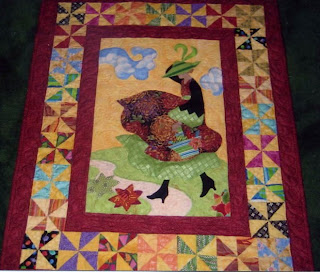Reprinted
By Patricia SullivanWashington Post Staff WriterMonday, September 3, 2007Cuesta Benberry, 83, one of the nation's foremost quilt scholars who pieced together the history of the art from castoff patches of information, died of congestive heart failure Aug. 23 at Forest Park Hospital in St. Louis.
Mrs. Benberry's research was so fundamental that "in nearly every quilt book today, Cuesta Benberry will be quoted in the text or her name will appear in the bibliography," the Quilters Hall of Fame noted when she was inducted in 1983.
"She began to look very seriously at all the aspects of quiltmaking -- where patterns came from, the people who made them -- at a time when people weren't looking at quilts, much less the history of quilts," said Bettina Havig, a quilt historian from Columbia, Mo.
Not a quilter herself, Mrs. Benberry nevertheless became interested in the art and craft when her mother-in-law gave her a quilt. When she visited her in-laws, who lived in Kentucky, she began to learn about the pride that women took in that work.
"I think we get so emotional about quilts because they're such an integral part of many people's lives," Mrs. Benberry told the Arkansas Democrat-Gazette in 1998. "They're on the bed. They're there at birth. They're there at death. They're part of the marriage bed. They're part of our lives, and they give us so many memories. . . . You'd call a quilt like you would a child. [Her mother-in-law would] lift up a trunk lid and say, 'Come see my Sugar Bowl'; she didn't say, 'Come see my blue-and-white quilt.' Then I wanted to learn more about their history."
Mrs. Benberry's occupation was teaching in the St. Louis public schools, but her preoccupation since the 1960s had been learning about quilts, said her son, George V. Benberry of Elgin, Ill. She collected paper ephemera, which are the once-overlooked patterns, records and documentation of quilts and quiltmakers. She is credited with rescuing innumerable documents from oblivion, researching their importance and communicating that to the world.
At one point, Mrs. Benberry became interested in kit quilts, commercial packages that provide everything, except the skill, that a quilter would need to create a comforter. By tracking down and photographing quilts at innumerable country fairs, Mrs. Benberry discovered that up to 60 percent of those submitted were from kits, rather than original designs, said Xenia Cord of Kokomo, Ind., president of the American Quilt Study Group.
"She was a serious scholar at a time when the kinds of conveniences we take for granted -- digital photography, copying machines, e-mail -- weren't possible. She did the difficult research," Cord said. "She also inspired innumerable people to research. She would hone right in on what you should look at and force you to ever finer and finer points. . . . She wasn't going to allow you to be content with just a surface topic. She was unfailingly generous with her support and with her mentoring."
Born in Cincinnati and raised in St. Louis, Mrs. Benberry graduated from what is now Harris-Stowe State University in St. Louis. She received a master's degree in library science from the University of Missouri at St. Louis. She worked in the local school system for 40 years and retired in 1985.
In a 1998 article she wrote for the St. Louis Post-Dispatch, Mrs. Benberry said that about 1976, she began focusing on quilts made by African American women. "I soon realized that any investigation of quilt history, a female-dominated narrative, would also be closely allied to women's history," she wrote. Mrs. Benberry also found that previous exhibitions of quilts by African American women focused almost exclusively on those from selected areas of the rural South.
She organized a traveling quilt show for the Kentucky Quilt Project of Louisville, which demonstrated the breadth of quilts by African Americans. The exhibit appeared in 1993 at the Anacostia museum in Southeast Washington.
"African-American quilt makers' backgrounds, living conditions, needs, access to materials, aesthetic sensibilities, creative impulses and technical skills were vastly divergent," Mrs. Benberry wrote in the exhibit brochure, arguing that no single style represented them. "Thus it is a simplistic notion that legions of black quilt makers produced works displaying a single aesthetic orientation."
Mrs. Benberry was a founder of the American Quilt Study Group and was honored by the American Folk Art Museum in New York in 2004. In addition to organizing exhibitions, Mrs. Benberry wrote four books: "Always There: The African-American Presence in American Quilts" (1992), "Patchwork of Pieces: An Anthology of Early Quilt Stories, 1845-1940" (1993), "Piece of My Soul: Quilts by Black Arkansans" (2000) and "Love of Quilts: A Treasury of Classic Quilting Stories" (2004). The only quilt Mrs. Benberry made, a sampler, also reflects her research: It is composed of blocks that appeared in earlier African American quilts.
In addition to her son, survivors include her husband of 56 years, George L. Benberry of St. Louis; two grandchildren; and two great-grandchildren.
 The Clara Ford Foundation will be "in the house" promoting African American quilting Tuesday, September 25, 2007 at the YWCA Open Your Purse Event! The event is a fund raiser for the Atlanta YWCA. There will be over 400 women at the Downtown Ritz Carlton ready to open their purses to support the YWCA. For more information about the event go to http://www.ywcaatlanta.org/
The Clara Ford Foundation will be "in the house" promoting African American quilting Tuesday, September 25, 2007 at the YWCA Open Your Purse Event! The event is a fund raiser for the Atlanta YWCA. There will be over 400 women at the Downtown Ritz Carlton ready to open their purses to support the YWCA. For more information about the event go to http://www.ywcaatlanta.org/


